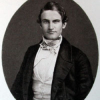Francis Parkman

Francis Parkman
Francis Parkman, Jr.was an American historian, best known as author of The Oregon Trail: Sketches of Prairie and Rocky-Mountain Life and his monumental seven-volume France and England in North America. These works are still valued as historical sources and as literature. He was also a leading horticulturist, briefly a professor of Horticulture at Harvard University and author of several books on the topic. Parkman was a trustee of the Boston Athenæum from 1858 until his death in 1893...
NationalityAmerican
ProfessionHistorian
Date of Birth16 September 1823
CountryUnited States of America
The raft was at length complete. We piled our goods upon it, with the exception of our guns, which each man chose to retain in his own keeping.
France built its best colony on a principle of exclusion, and failed; England reversed the system, and succeeded.
Early on the next morning we reached Kansas, about five hundred miles from the mouth of the Missouri.
Many of the Iroquois and Huron houses were of similar construction, the partitions being at the sides only, leaving a wide passage down the middle of the house.
The monk, the inquisitor, and the Jesuit were lords of Spain,- sovereigns of her sovereign, for they had formed the dark and narrow mind of that tyrannical recluse. They had formed the minds of her people, quenched in blood every spark of rising heresy, and given over a noble nation to a bigotry blind and inexorable as the doom of fate. Linked with pride, ambition, avarice, every passion of a rich, strong nature, potent for good and ill, it made the Spaniard of that day a scourge as dire as ever fell on man.
In the middle of the sixteenth century, Spain was the incubus of Europe. Gloomy and portentous, she chilled the world with her baneful shadow.
The growth of New England was a result of the aggregate efforts of a busy multitude, each in his narrow circle toiling for himself, to gather competence or wealth. The expansion of New France was the achievement of a gigantic ambition striving to grasp a continent. It was a vain attempt.
We were now, as I before mentioned, upon this St. Joseph's trail. It was evident, by the traces, that large parties were a few days in advance of us; and as we too supposed them to be Mormons, we had some apprehension of interruption.
We were now arrived at the close of our solitary journeyings along the St. Joseph's trail.
Four men are missing; R., Sorel and two emigrants. They set out this morning after buffalo, and have not yet made their appearance; whether killed or lost, we cannot tell.
The young nobles, of whom there were many, were volunteers, who had paid their own expenses in expectation of a golden harvest, and they chafed in impatience and disgust. The religious element in the colony-unlike the former Huguenot emigration to Brazil--was evidently subordinate. The adventurers thought more of their fortunes than of their faith.
It was a rich and gorgeous sunset - an American sunset; and the ruddy glow of the sky was reflected from some extensive pools of water among the shadowy copses in the meadow below.
When America was first made known to Europe, the part assumed by France on the borders of that new world was peculiar, and is little recognized. While the Spaniard roamed sea and land, burning for achievement, red-hot with bigotry and avarice, and while England, with soberer steps and a less dazzling result, followed in the path of discovery and gold-hunting, it was from France that those barbarous shores first learned to serve the ends of peaceful commercial industry.
Fort Leavenworth is in fact no fort, being without defensive works, except two block-houses.